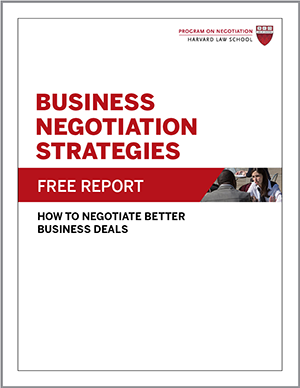
In an episode of the fictional HBO series Silicon Valley, partners in a red-hot technology startup, Pied Piper, receive funding offers from a number of venture capitalist firms. Raviga Capital is by far the highest bidder; its offer of $20 million values Pied Piper at a whopping $100 million.
The entrepreneurs are about to accept the deal when a Raviga insider they trust warns that, if Pied Piper is unable to steadily increase its valuation above $100 million over time—which it is unlikely to do, she says—it could become a pariah in Silicon Valley.
What to do? The insider advises Pied Piper to negotiate a worse deal from Raviga to improve its long-term odds of success. That’s just what Pied Piper’s founder, Richard Hendricks, does: in his counteroffer to Raviga, he bargains down to a $10 million offer that values Pied Piper at a much lower $50 million. Though somewhat confused, Raviga takes the deal.
As this fictional negotiation story suggests, when you’re selling a hot commodity that everyone wants to buy, there may be certain long-term risks to consider.
Beyond Silicon Valley
The Pied Piper story is a fictional one, but it does have parallels in the real world. (For more information on complex bargaining scenarios, see also: Giving Voice to Negotiators Away from the Bargaining Table).
In the publishing industry, for example, literary agents sometimes succeed in brewing up a bidding war for a manuscript from a “hot” new writer. The writer may be thrilled to accept a sky-high advance from the winning bidder, such as $1 million for a promising first novel. But what if the book fails to live up to sales expectations, and the publisher fails to earn back the advance? The writer may fail to attract any bids for her second book, and her once-promising career might effectively be over. A more modest first deal might have led to less disappointment and greater long-term success.
That doesn’t mean that the writer should reject or bargain down that great offer for her first book. After all, the book could live up to expectations; she may never write another book; and/or she may really need the money now. But such stories do suggest potential hidden long-term negotiation costs.
The perils of auctions
If a bidder overpays for your commodity, you may find yourself treated like tainted goods down the road. Why? Two negotiation biases come into play. First, as human beings, we often succumb to the trap of irrationally escalating commitment to a chosen course of action. In negotiations ranging from labor strikes to custody battles to M&A negotiations, a desire to win at any cost can lead us to throw good money after bad, according to Harvard Business School professor Max H. Bazerman (see also, The Advantages of Bias at the Bargaining Table).
Second, in auctions, the winning bidder is often a victim of the winner’s curse, or the proven tendency for the party who wins an auction for a commodity of uncertain value to pay more than the asset is actually worth. If it later becomes clear that the buyer overpaid, both buyer and seller could end up regretting the deal down the road.
The tendency to irrationally escalate commitment has numerous causes, according to Bazerman, including the tendency to view negotiations and auctions as competitions, a mindset that can lead us to overlook our true goals.
Entering auctions with open eyes
How can we balance the desire to get a great short-term deal financially against the longer-term risk of being overvalued to the point that we suffer damage to our reputation? Here are three pieces of advice:
1. Analyze your needs and wants. Before someone (such as an agent) tries to pressure you into trying to get a bidding war brewing for your commodity, take time to analyze what you value. Prioritize your interests and weight them using a scoring system. Consider not just want you want now but what you might want years from now.
2. Consider a “negotiauction.” By limiting parties’ interests to a single issue (price), many auctions fail to capitalize on the opportunities to create value that can be gained by discussing multiple issues. You may be able to get the best of both worlds—negotiations and auctions—through a hybrid “negoti-auction” process, according to Harvard Business School and Harvard Law School professor Guhan Subramanian. For example, you might hold an auction and then negotiate privately with the three top bidders to get the best all-around deal.
3. Discuss the other party’s expectations. If a bidder or potential bidder seems to hold unrealistic beliefs about your commodity’s value, talk to them about what they expect to achieve from the deal over time and how you might work together to meet those goals. A candid conversation about expectations should help you determine if the bidder is the right long-term partner for you.
Related Article: Use Power Wisely at the Negotiation Table





